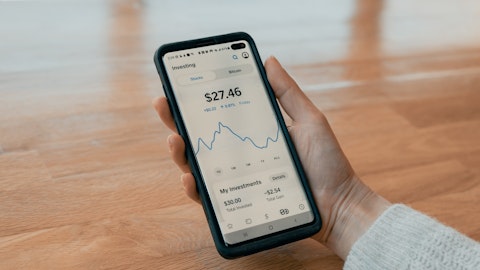Kevin Lansberry: Yeah, Kannan. There’s very significant growth across our direct-to-consumer business and at our Parks and Experiences business also. So those two businesses predominantly are the big growth drivers as you begin to look at relative to the prior year where we’re getting that kind of growth.
Alexia Quadrani: Operator, next question please.
Operator: Our next question comes from Brett Feldman from Goldman Sachs. Please go ahead with your question.
Brett Feldman: Thanks. So I’m curious how your experience with Disney+ Hotstar shape your view on your long-term international streaming strategy. Are you thinking about maybe exiting those markets or any markets and maybe focusing more on content licensing or partnerships? And is it essential that you reshape that international strategy in any way to meet your long-term profitability objectives?
Robert Iger: We actually have been looking at multiple markets around the world with an eye toward prioritizing those that are going to help us turn this business into a profitable business. What that basically means is there are some markets that we will invest less in local programming but still maintain the service. There are some markets that we may not have a service at all. And there are others that we’ll consider, I’ll call it, high-potential markets where we’ll invest nicely for local programming, marketing and basically full-service content in those markets. Basically, what I’m saying is not all markets are created equal. And in terms of our march to profitability, one of the ways we believe we’re going to do that is by creating priorities internationally.
Alexia Quadrani: Operator, we have time for one more question.
Operator: Our next question comes from Michael Morris from Guggenheim. Please go ahead with your question.
Michael Morris: Thank you very much. Good afternoon, guys. So on the theme of considering options for Disney, there was an article published recently that speculated that the entire company could be sold to a larger technology company. So Bob, my straightforward question is, do you see a plausible scenario where the entire company would be sold? Maybe a bit more broadly, though, when you think of maximum value of the Disney enterprise, do you think that can be achieved by being more aligned with a single technology partner or is that value maximized through partnering with a variety of tech platforms? And if I could just sneak one in on the PENN Gaming announcement. Does it — will you forego advertising partnerships with all other betting or sports gaming partners? And if so, how much impact will that have in exchange for building value in this partnership?
Robert Iger: Michael, I just am not going to speculate about the potential for Disney to be acquired by any company, whether a technology company or not. Obviously, anyone who want to speculate about these things would have to immediately consider the global regulatory environment. I’ll say no more than that. It’s just — it’s not something that we obsess about.
Kevin Lansberry: Great. And then, Michael, with respect to any foregone economics or no longer accepting advertising from other gaming companies, I don’t see us in a position where we’ll ever be in that situation. So…
Alexia Quadrani: Okay. Thanks for the question, and I want to thank everyone for joining us today. Note that a reconciliation of our non-GAAP measures that were referred to on this call to equivalent GAAP measures can be found on our Investor Relations website. Let me also remind you that certain statements on this call, including financial estimates or statements about our plans, guidance or expectations or other statements that are not historical in nature may constitute forward-looking statements under the securities laws. We make these statements on the basis of our views and assumptions regarding future events and business performance at the time that we make them and we do not undertake any obligation to update these statements.





